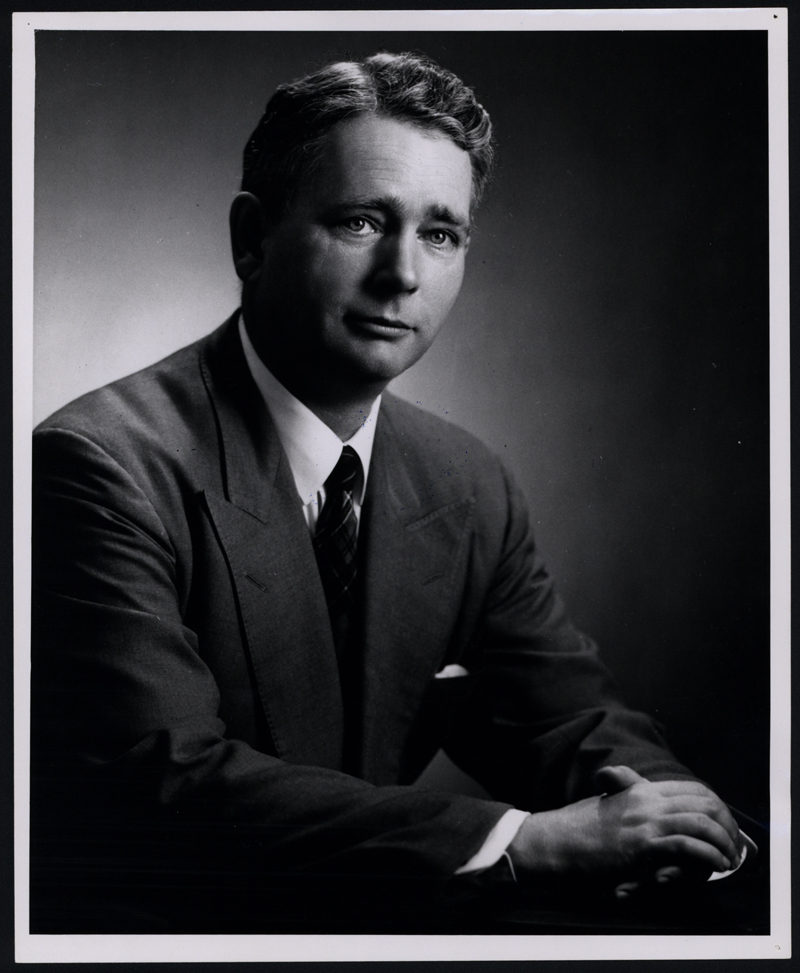Malcolm Mackenzie Ross
1911-2002
Malcolm Mackenzie Ross (literary critic, editor, author, and professor) was born on 2 January 1911 in Fredericton, New Brunswick and attended Smythe Street School and Fredericton High School before continuing to the University of New Brunswick for his undergraduate studies. Ross then went to the University of Toronto, where he received his master’s degree in Renaissance literature in 1934. In 1939 Ross decided to pursue a PhD at Cornell University. Upon completion of his doctoral degree in 1941, he took a post at Indiana University for a year. He was then hired by John Grierson at the National Film Board. He left the NFB in 1945 and taught at the University of Manitoba (1945-1950), Queen’s University (1950-1962), Trinity College (1964-1967), and Dalhousie University (1968-1982). He was also a visiting professor at the University of Edinburgh (1982). While in these positions, Ross served as editor of Queen’s Quarterly (1953-1956), head of Queen’s University English department, dean of arts at Trinity, and chairman of the Cultural Activities Committee at Dalhousie University (1968-1972). His first book, Milton’s Royalism: A Study of the Conflict of Symbol and the Idea in Poems, was published in 1943. Ross then received a Guggenheim Fellowship in 1945 that allowed him to spend six months at Harvard and six months at the Huntingdon Library in Pasadena, California, to work on Poetry and Dogma: The Transfiguration of Eucharistic Symbols in Seventh Century English Poetry (1954). Ross was a critic of Canadian literature and his works in this area were Our Sense of Identity: A Book of Canadian Essays (1954), The Arts in Canada: A Stock-taking at Mid-Century (1959), Poets of the Confederation (1960), and The Impossible Sum of Our Traditions: Reflections on Canadian Literature (1986). Ross developed the New Canadian Library, a reprint series of Canadian literature in paperback, founded in 1957. Ross edited the series until 1978. From 1950-1956, Ross appeared on the CBC Radio program called Critically Speaking with Robert Weaver. On 23 June 1976, Ross was awarded the Order of Canada for his contributions to education as well as his work with the New Canadian Library. He also received the Lorne Pierce Medal from the Royal Society of Canada (1981), the Northern Telecom International Award in Canadian Studies (1985), the Diplome d’Honneur from the Canadian Conference of the Arts (1990), and the Queen’s Silver and Golden Jubilee Medals from the Office of the Governor General (1977, 2002). Honorary degrees were granted to Ross by St. Thomas University (1976), Trent University (1982), University of Edinburgh (1986), Queen’s University (1989), University of Windsor (1989), University of Toronto (1990), and Acadia University (1991). Ross died of pneumonia on 4 November 2002 at the age of 92 in Halifax, Nova Scotia.
Embree, Victoria. "Malcolm Ross." New Brunswick Literary Encyclopedia, Winter 2012. Accessed 24 May 2023.
Archival Material
-
Malcolm Ross fonds
⌄Website/Catalogue RecordRetrieval NumberACU SPC F0027Date Range of Material1934-1976Extent
0.5 m of textual records
Scope and Content NoteFonds consists of correspondence, chiefly relating to the New Canadian Library Series published by McClelland and Stewart under the general editorship of M. Ross; reviews; and works on M. Ross.
-
Malcolm MacKenzie Ross fonds
⌄Website/Catalogue RecordRetrieval NumberUA RG 139Date Range of Material1935, 1951-1990, 1997Extent
13 cm textual records
Scope and Content NoteThis fonds documents various aspects of Malcolm MacKenzie Ross's literary and scholarly activities. It includes originals and copies of correspondence, invitations, newspaper clippings, copies of citations, copies of speeches and addresses (delivered by Ross), and copies of published articles and reviews (by Ross). The fonds also includes published articles about Ross and reviews of his work as well as biographical information. Many of the notes are addressed to "Alfie" [A.G. Bailey].

Malcolm Mackenzie Ross
"Dr. Malcolm M. Ross." Courtesy of Archives & Special Collections, University of New Brunswick Libraries. UA PC 2, item 45, [1962?]. Accessed 24 May 2023.

See the New Brunswick Literary Encyclopedia entry.